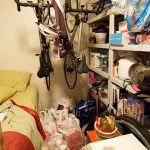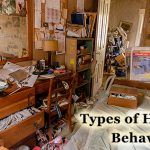Junk occasionally clutters the average person’s home. Extreme situations, however, are indications of an underlying issue. When the tendency to accumulate random possessions overtakes the home, blocking exits and entrances, causing fire hazards and creating a toxic environment, a detrimental hoarding disorder has taken grip.
Hoarding Disorder Defined

A hoarding disorder involves collecting objects randomly and without specific rhyme or reason. Hundreds of empty pill bottles, used cat litter, decades’ worth of old fast food receipts and plastic drinking cups, broken glass, and even animal waste may lay in a disastrous mess inside a hoarder’s home. People with a hoarding disorder may even accrue innumerable animals, like cats.
Stockpiling these items severely restricts the homeowner from freely moving around the home. Loads of newspapers sit in the bathtub, making the bathroom nonfunctional. Dead animals, often found in the homes of hoarders, cause serious biohazard issues. Used Band-Aids spotted with dried blood unleash a host of pathogens into the environment. Junk piles high to the ceiling, blocking fire exits.
Health Risks Associated with a Hoarding Disorder
Hoarding poses serious health concerns. The accumulation of flammable waste is a major fire hazard. Occupants may suffer from serious burns should their possessions catch fire and engulf the home in flames. A risk of death also exists. Fire exits are blocked, or the hoarder encounters innumerable obstacles in their path that delay reaching fire exits quickly enough to escape bursting flames. First responders who arrive are unable to reach the victim or help them escape the house fire quickly enough, due to blocked entrances and the cascade of garbage infiltrating the home.
Mold growth is another health issue in homes owned by those with a hoarding disorder. Infestations of mold are known to cause respiratory illnesses, coughing, runny nose and skin irritations. Water damage in the hoarder’s home is likely to go unnoticed. The clutter of items makes detecting a leaking pipe nearly impossible.
Fall hazards are prevalent in hoarders’ homes. With superfluous junk scattered along hallways, clear pathways are unavailable. The hoarder increases his or her risk for falls inside the home. The chaotic mess inside the home also puts visitors and other occupants of the home at serious risks for trips and falls. Precarious, sky-high piles of junk may also fall on top of the guests or the hoarder, causing injury.
Immunocompromised people suffer greatly when inside a hoarder’s home. The lack of proper sanitization is a major health hazard. Animal or human waste is commonly stored by hoarders, leaving the home’s occupants vulnerable to illness. The ammonia levels that result from collected urine or feces can aggravate the health of those with cardiac or respiratory conditions.
The lack of hygiene present in people with hoarding disorders may cause chronic sickness in the hoarder.
Hoarding Disorder Classified
The Diagnostic and Statistical Manual of Mental Disorders classifies hoarding as a mental illness. Health professionals link hoarding disorders to obsessive-compulsive disorder, as both conditions display similar symptoms.
Individuals with a hoarding disorder are unable to discard the surplus contents of their home without experiencing severe stress, anxiety and distress. To avoid the negative feelings, hoarders continue to amass toxic junk. Isolation from family, problems with work, and financial troubles are also direct consequences of those who hoard.
Hoarding disorders are linked to family history; if a family member suffers from hoarding issues, their progeny is also likely to suffer from the same condition. Hoarding disorders develop gradually, over the course of 10 to 20 years, for instance.
Health Insurance Impacts for Hoarders

Given the enormous health consequences associated with hoarding disorders, affected individuals and their loved ones would want to understand how health insurance costs are impacted. In recent years, health insurers are legally bound to abide by new health insurance laws and eligibility requirements. Prior to 2014, health insurers were under no obligation to cover the medical expenses of people with pre-existing conditions, like hoarding.
As of 2014, health insurers are prevented from denying coverage to individuals with pre-existing conditions, including diagnosed medical conditions, like hoarding. Insurers are also no longer allowed to spike premiums with certain pre-existing illnesses. As a result, a hoarder’s health insurance costs will fail to rise in comparison with a healthy and tidy neighbor’s health insurance premium. Plus, health insurance applications no longer request details of health conditions prior to enrollment.
Help with Hoarding Disorders
Individuals with a hoarding disorder are unlikely to reach out for help. Embarrassment of their inacceptable living conditions keeps them isolated from family and friends. When a hoarder’s situation is out in the open, family members become aware of the situation and are likely to seek help on behalf of their loved one. Professionals like licensed therapists are qualified to offer hoarding treatments to the person with a hoarding disorder. Plus, professional cleaning companies can be hired to thoroughly clean the property of the individual suffering from a hoarding disorder.
ServiceMaster of Lancaster County
ServiceMaster of Lancaster County offers professional hoarding cleanup services. Skilled technicians from ServiceMaster of Lancaster County use a compassionate approach to handling hoarding cleanup. Specialists work with the hoarder and family with the utmost sensitivity. A trusted relationship is developed between ServiceMaster of Lancaster County technicians and the person affected with the hoarding disorder. Prior to discarding items, technicians consult the individuals, receiving full approval before throwing out the collected possessions.
Sanitization of the home is critical. ServiceMaster of Lancaster County techs disinfect the home once all the refuse, like biohazards, are properly disposed of. The decontamination process also includes removing mold and bacteria. Once the home is cleaned, odors from cigarettes and decayed objects are lifted using safe and effective deodorizers.
After the home is thoroughly cleaned and sanitized, ServiceMaster of Lancaster County technicians follow up to ensure the home is maintained. Additional cleanings may be scheduled, as needed. The team also works with the homeowner’s insurance to file claims.
Free Estimate
Lincoln, Nebraska residents benefit from the professional and compassionate hoarding cleanup services provided by the team at ServiceMaster of Lancaster County. A free estimate is available at (888) 915-7197 to community members when hoarding issues impact the lives of residents.




